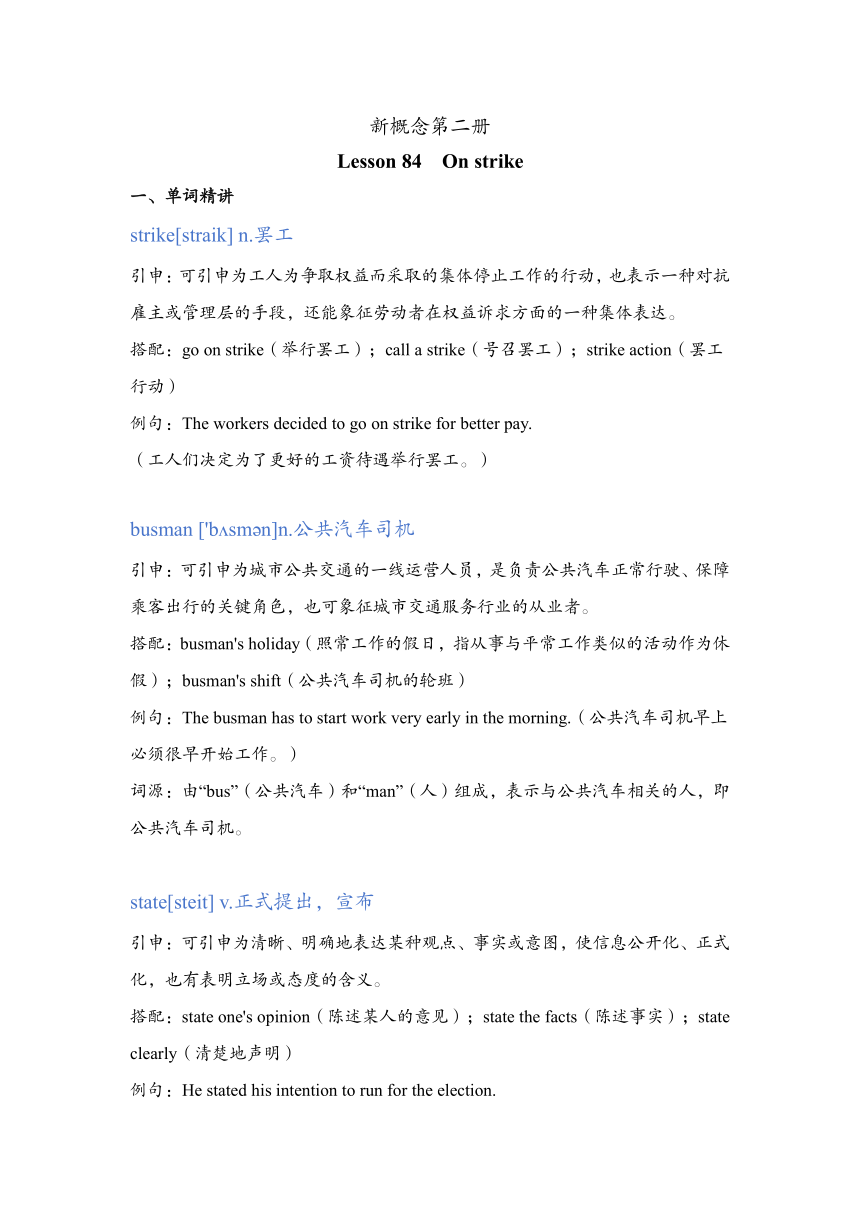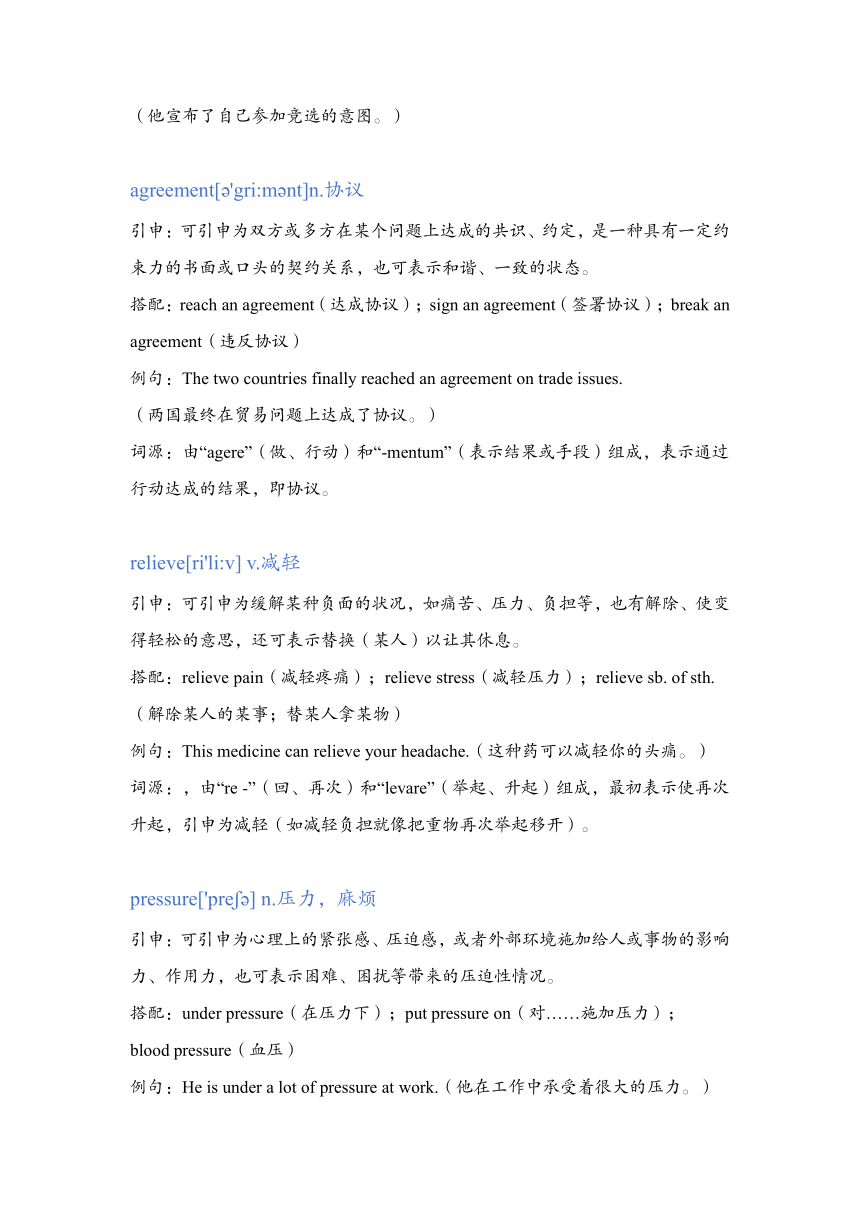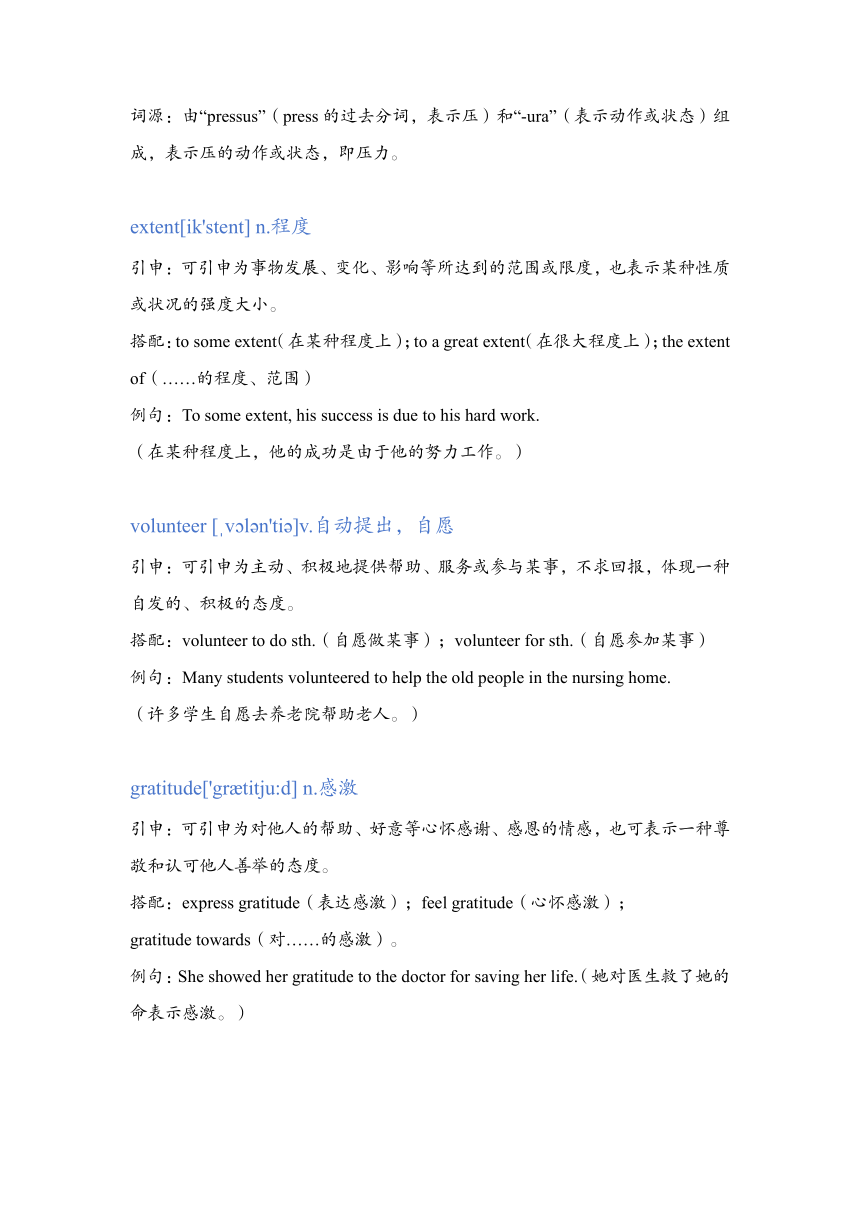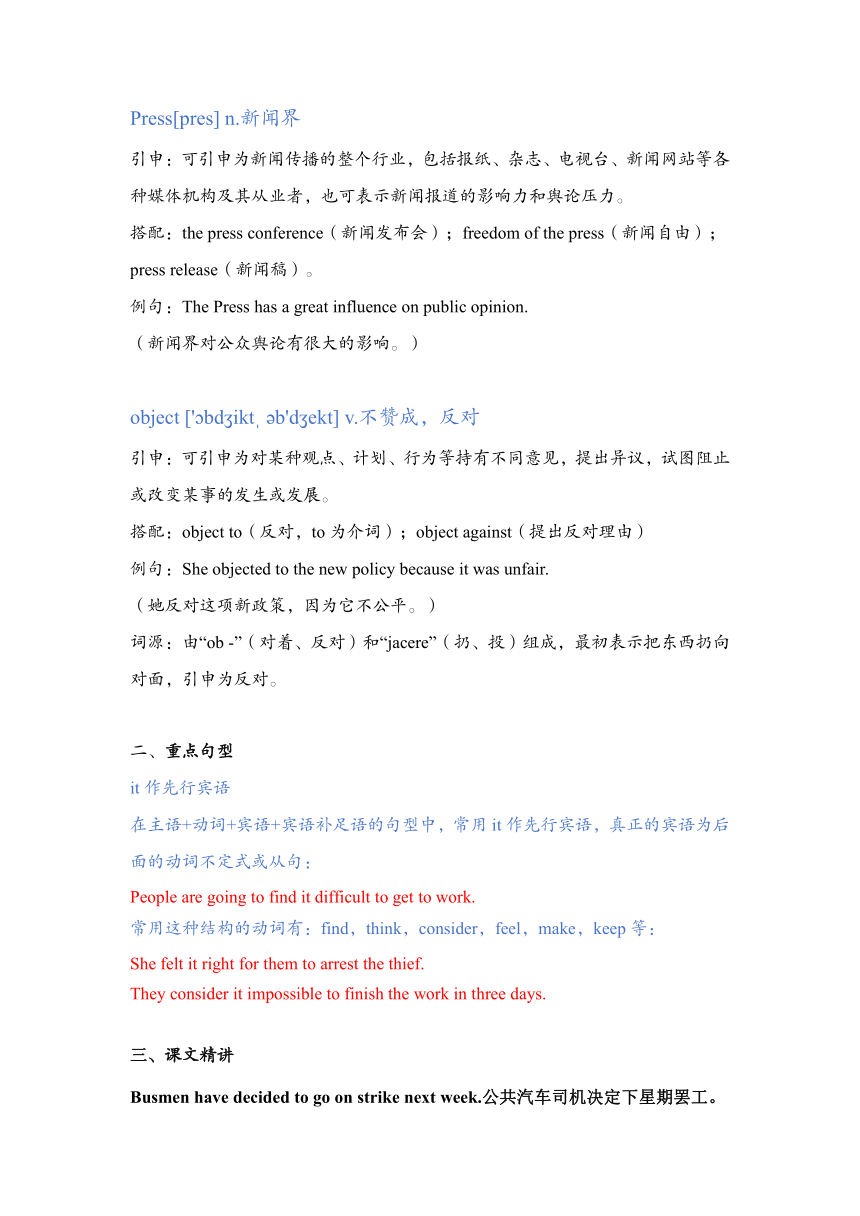新概念第二册Lesson 84 On strike讲义
文档属性
| 名称 | 新概念第二册Lesson 84 On strike讲义 |  | |
| 格式 | docx | ||
| 文件大小 | 134.5KB | ||
| 资源类型 | 教案 | ||
| 版本资源 | 新概念英语 | ||
| 科目 | 英语 | ||
| 更新时间 | 2024-11-25 17:32:16 | ||
图片预览




文档简介
新概念第二册
Lesson 84 On strike
单词精讲
strike[straik] n.罢工
引申:可引申为工人为争取权益而采取的集体停止工作的行动,也表示一种对抗雇主或管理层的手段,还能象征劳动者在权益诉求方面的一种集体表达。
搭配:go on strike(举行罢工);call a strike(号召罢工);strike action(罢工行动)
例句:The workers decided to go on strike for better pay.
(工人们决定为了更好的工资待遇举行罢工。)
busman ['b sm n]n.公共汽车司机
引申:可引申为城市公共交通的一线运营人员,是负责公共汽车正常行驶、保障乘客出行的关键角色,也可象征城市交通服务行业的从业者。
搭配:busman's holiday(照常工作的假日,指从事与平常工作类似的活动作为休假);busman's shift(公共汽车司机的轮班)
例句:The busman has to start work very early in the morning.(公共汽车司机早上必须很早开始工作。)
词源:由“bus”(公共汽车)和“man”(人)组成,表示与公共汽车相关的人,即公共汽车司机。
state[steit] v.正式提出,宣布
引申:可引申为清晰、明确地表达某种观点、事实或意图,使信息公开化、正式化,也有表明立场或态度的含义。
搭配:state one's opinion(陈述某人的意见);state the facts(陈述事实);state clearly(清楚地声明)
例句:He stated his intention to run for the election.
(他宣布了自己参加竞选的意图。)
agreement[ 'gri:m nt]n.协议
引申:可引申为双方或多方在某个问题上达成的共识、约定,是一种具有一定约束力的书面或口头的契约关系,也可表示和谐、一致的状态。
搭配:reach an agreement(达成协议);sign an agreement(签署协议);break an agreement(违反协议)
例句:The two countries finally reached an agreement on trade issues.
(两国最终在贸易问题上达成了协议。)
词源:由“agere”(做、行动)和“-mentum”(表示结果或手段)组成,表示通过行动达成的结果,即协议。
relieve[ri'li:v] v.减轻
引申:可引申为缓解某种负面的状况,如痛苦、压力、负担等,也有解除、使变得轻松的意思,还可表示替换(某人)以让其休息。
搭配:relieve pain(减轻疼痛);relieve stress(减轻压力);relieve sb. of sth.(解除某人的某事;替某人拿某物)
例句:This medicine can relieve your headache.(这种药可以减轻你的头痛。)
词源:,由“re -”(回、再次)和“levare”(举起、升起)组成,最初表示使再次升起,引申为减轻(如减轻负担就像把重物再次举起移开)。
pressure['pre ] n.压力,麻烦
引申:可引申为心理上的紧张感、压迫感,或者外部环境施加给人或事物的影响力、作用力,也可表示困难、困扰等带来的压迫性情况。
搭配:under pressure(在压力下);put pressure on(对……施加压力);
blood pressure(血压)
例句:He is under a lot of pressure at work.(他在工作中承受着很大的压力。)
词源:由“pressus”(press的过去分词,表示压)和“-ura”(表示动作或状态)组成,表示压的动作或状态,即压力。
extent[ik'stent] n.程度
引申:可引申为事物发展、变化、影响等所达到的范围或限度,也表示某种性质或状况的强度大小。
搭配:to some extent(在某种程度上);to a great extent(在很大程度上);the extent of(……的程度、范围)
例句:To some extent, his success is due to his hard work.
(在某种程度上,他的成功是由于他的努力工作。)
volunteer [ v l n'ti ]v.自动提出,自愿
引申:可引申为主动、积极地提供帮助、服务或参与某事,不求回报,体现一种自发的、积极的态度。
搭配:volunteer to do sth.(自愿做某事);volunteer for sth.(自愿参加某事)
例句:Many students volunteered to help the old people in the nursing home.
(许多学生自愿去养老院帮助老人。)
gratitude['gr titju:d] n.感激
引申:可引申为对他人的帮助、好意等心怀感谢、感恩的情感,也可表示一种尊敬和认可他人善举的态度。
搭配:express gratitude(表达感激);feel gratitude(心怀感激);
gratitude towards(对……的感激)。
例句:She showed her gratitude to the doctor for saving her life.(她对医生救了她的命表示感激。)
Press[pres] n.新闻界
引申:可引申为新闻传播的整个行业,包括报纸、杂志、电视台、新闻网站等各种媒体机构及其从业者,也可表示新闻报道的影响力和舆论压力。
搭配:the press conference(新闻发布会);freedom of the press(新闻自由);press release(新闻稿)。
例句:The Press has a great influence on public opinion.
(新闻界对公众舆论有很大的影响。)
object [' bd ikt b'd ekt] v.不赞成,反对
引申:可引申为对某种观点、计划、行为等持有不同意见,提出异议,试图阻止或改变某事的发生或发展。
搭配:object to(反对,to为介词);object against(提出反对理由)
例句:She objected to the new policy because it was unfair.
(她反对这项新政策,因为它不公平。)
词源:由“ob -”(对着、反对)和“jacere”(扔、投)组成,最初表示把东西扔向对面,引申为反对。
重点句型
it作先行宾语
在主语+动词+宾语+宾语补足语的句型中,常用it作先行宾语,真正的宾语为后面的动词不定式或从句:
People are going to find it difficult to get to work.
常用这种结构的动词有:find,think,consider,feel,make,keep等:
She felt it right for them to arrest the thief.
They consider it impossible to finish the work in three days.
课文精讲
Busmen have decided to go on strike next week.公共汽车司机决定下星期罢工。
go on strike 举行罢工
on strike 在罢工
It is not clear yet when the teachers on strike will return to their classrooms.
The strike is due to begin on Tuesday.罢工定于星期二开始
due adj. 预定的,约定的
be due to do sth. 定于(某时做某事)
The plane is due (to arrive) in London at 9 o’clock.
be due to +n. 由于……,因为……
Our delay was due to the heavy traffic.
No one knows how long it will last.谁也不知道会持续多久。
这是一个复合句。“No one”是主语,表示“没有人”。“knows”是谓语动词,表示“知道”。“how long it will last”是宾语从句,在这个从句中,“how long”是疑问词组作状语,“it”是主语,指代“the strike”,“will last”是谓语,表示“持续”。
“last”在这里是动词,意为“持续、延续”。
The busmen have stated that the strike will continue until general agreement is reached about pay and working conditions.
司机们声称此次罢工将一直持续到就工资和工作条件问题达成全面协议的时候为止。
这是一个复合句。“The busmen”是主语,表示“公共汽车司机”。“have stated”是现在完成时,表示已经陈述的动作。“that the strike will continue until general agreement is reached about pay and working conditions”是宾语从句,在这个从句中,“the strike”是主语,“will continue”是谓语,表示“将继续”,“until general agreement is reached about pay and working conditions”是时间状语从句,其中“until”是引导词,“general agreement”是主语,“is reached”是一般现在时的被动语态,表示“被达成”,“about pay and working conditions”是介词短语作后置定语,修饰“agreement”。
“state”在这里是动词,意为“陈述、说明”。
Most people believe that the strike will last for at least a week.
多数人认为此次罢工至少会持续一个星期。
这是一个复合句。“Most people”是主语,表示“大多数人”。“believe”是谓语动词,表示“相信”。“that the strike will last for at least a week”是宾语从句,在这个从句中,“the strike”是主语,“will last”是谓语,表示“将持续”,“for at least a week”是时间状语,表示持续的时间。
“at least”是固定短语,意为“至少”。
Many owners of private cars are going to offer 'free rides' to people on their way to work.
很多私人汽车的车主正准备为乘车上班的人们提供“免费乘车”的服务,这将在某种程度上减轻对火车的压力。
free ride 免费乘车
“offer sth. to sb.”是固定短语,意为“向某人提供某物”。
This will relieve pressure on the trains to some extent.
to some extent =to a certain extent 在某种程度上
The weather has helped me to some/a certain extent.
Meanwhile, a number of university students have volunteered to drive buses while the strike lasts.
与此同时,有一部分大学生自愿在罢工期间驾驶公共汽车。
这是一个复合句。“Meanwhile”是副词,表示“与此同时”。“a number of university students”是主语,表示“许多大学生”。“have volunteered”是现在完成时,表示已经自愿做某事。“to drive buses”是不定式短语作宾语,表示自愿做的事情。“while the strike lasts”是时间状语从句,其中“while”是引导词,“the strike”是主语,“lasts”是谓语,表示“持续”。
“volunteer to do sth.”是固定短语,意为“自愿做某事”。
All the students are expert drivers, but before they drive any of the buses, they will have to pass a special test.
所有的学生都是开车的能手,但在驾驶公共汽车之前,他们必须通过一项专门测验。
这是一个由并列连词“but”连接的并列句。“All the students are expert drivers”是其中一个句子,“All the students”是主语,表示“所有的学生”,“are”是系动词,“expert drivers”是表语,表示“熟练的司机”。“before they drive any of the buses, they will have to pass a special test”是另一个句子,“before they drive any of the buses”是时间状语从句,其中“before”是引导词,“they”是主语,“drive”是谓语,“any of the buses”是宾语,“they will have to pass a special test”是主句,“they”是主语,“will have to pass”是一般将来时,表示将不得不做某事,“a special test”是宾语。
“expert”在这里是形容词,意为“熟练的、内行的”。
The students are going to take the test in two days' time.
学生们准备在两天后就接受测验。
这是一个简单句。“The students”是主语,表示“学生们”。“are going to take”是一般将来时,表示打算做某事,“the test”是宾语,表示“测试”,“in two days' time”是时间状语,表示在未来的某个时间。
“in two days' time”表示“两天后”。
Even so, people are going to find it difficult to get to work.
即使这样,人们仍会感到上班有困难。
这是一个简单句。“Even so”是副词短语,表示“即便如此”。“people”是主语,表示“人们”。“are going to find”是一般将来时,表示将要发现的动作,“it”是形式宾语,真正的宾语是“to get to work”,“difficult”是宾语补足语。
“find it + adj. + to do sth.”是固定结构,表示“发现做某事是……的”。
But so far, the public has expressed its gratitude to the students in letters to the Press.但到目前为止,公众已经向新闻界写信表达他们对学生们的感激之情了。
这是一个简单句。“But so far”是时间状语,表示“到目前为止”。“the public”是主语,表示“公众”。“has expressed”是现在完成时,表示已经表达的动作,“its gratitude”是宾语,表示“它(公众)的感激之情”,“to the students”是介词短语作状语,表示对象,“in letters to the Press”是介词短语作状语,表示方式。
“express”在这里是动词,意为“表达”。
Only one or two people have objected that the students will drive too fast!
只有一两个人提出反对意见,说学生们会把车开得太快!
object that… 提出异议,反对
They objected that the book was too difficult for them.
object to 名词/动名词 反对,不喜欢,不赞成
A lot of people object to smoking in public places.
Do you object to my sitting beside you
Lesson 84 On strike
单词精讲
strike[straik] n.罢工
引申:可引申为工人为争取权益而采取的集体停止工作的行动,也表示一种对抗雇主或管理层的手段,还能象征劳动者在权益诉求方面的一种集体表达。
搭配:go on strike(举行罢工);call a strike(号召罢工);strike action(罢工行动)
例句:The workers decided to go on strike for better pay.
(工人们决定为了更好的工资待遇举行罢工。)
busman ['b sm n]n.公共汽车司机
引申:可引申为城市公共交通的一线运营人员,是负责公共汽车正常行驶、保障乘客出行的关键角色,也可象征城市交通服务行业的从业者。
搭配:busman's holiday(照常工作的假日,指从事与平常工作类似的活动作为休假);busman's shift(公共汽车司机的轮班)
例句:The busman has to start work very early in the morning.(公共汽车司机早上必须很早开始工作。)
词源:由“bus”(公共汽车)和“man”(人)组成,表示与公共汽车相关的人,即公共汽车司机。
state[steit] v.正式提出,宣布
引申:可引申为清晰、明确地表达某种观点、事实或意图,使信息公开化、正式化,也有表明立场或态度的含义。
搭配:state one's opinion(陈述某人的意见);state the facts(陈述事实);state clearly(清楚地声明)
例句:He stated his intention to run for the election.
(他宣布了自己参加竞选的意图。)
agreement[ 'gri:m nt]n.协议
引申:可引申为双方或多方在某个问题上达成的共识、约定,是一种具有一定约束力的书面或口头的契约关系,也可表示和谐、一致的状态。
搭配:reach an agreement(达成协议);sign an agreement(签署协议);break an agreement(违反协议)
例句:The two countries finally reached an agreement on trade issues.
(两国最终在贸易问题上达成了协议。)
词源:由“agere”(做、行动)和“-mentum”(表示结果或手段)组成,表示通过行动达成的结果,即协议。
relieve[ri'li:v] v.减轻
引申:可引申为缓解某种负面的状况,如痛苦、压力、负担等,也有解除、使变得轻松的意思,还可表示替换(某人)以让其休息。
搭配:relieve pain(减轻疼痛);relieve stress(减轻压力);relieve sb. of sth.(解除某人的某事;替某人拿某物)
例句:This medicine can relieve your headache.(这种药可以减轻你的头痛。)
词源:,由“re -”(回、再次)和“levare”(举起、升起)组成,最初表示使再次升起,引申为减轻(如减轻负担就像把重物再次举起移开)。
pressure['pre ] n.压力,麻烦
引申:可引申为心理上的紧张感、压迫感,或者外部环境施加给人或事物的影响力、作用力,也可表示困难、困扰等带来的压迫性情况。
搭配:under pressure(在压力下);put pressure on(对……施加压力);
blood pressure(血压)
例句:He is under a lot of pressure at work.(他在工作中承受着很大的压力。)
词源:由“pressus”(press的过去分词,表示压)和“-ura”(表示动作或状态)组成,表示压的动作或状态,即压力。
extent[ik'stent] n.程度
引申:可引申为事物发展、变化、影响等所达到的范围或限度,也表示某种性质或状况的强度大小。
搭配:to some extent(在某种程度上);to a great extent(在很大程度上);the extent of(……的程度、范围)
例句:To some extent, his success is due to his hard work.
(在某种程度上,他的成功是由于他的努力工作。)
volunteer [ v l n'ti ]v.自动提出,自愿
引申:可引申为主动、积极地提供帮助、服务或参与某事,不求回报,体现一种自发的、积极的态度。
搭配:volunteer to do sth.(自愿做某事);volunteer for sth.(自愿参加某事)
例句:Many students volunteered to help the old people in the nursing home.
(许多学生自愿去养老院帮助老人。)
gratitude['gr titju:d] n.感激
引申:可引申为对他人的帮助、好意等心怀感谢、感恩的情感,也可表示一种尊敬和认可他人善举的态度。
搭配:express gratitude(表达感激);feel gratitude(心怀感激);
gratitude towards(对……的感激)。
例句:She showed her gratitude to the doctor for saving her life.(她对医生救了她的命表示感激。)
Press[pres] n.新闻界
引申:可引申为新闻传播的整个行业,包括报纸、杂志、电视台、新闻网站等各种媒体机构及其从业者,也可表示新闻报道的影响力和舆论压力。
搭配:the press conference(新闻发布会);freedom of the press(新闻自由);press release(新闻稿)。
例句:The Press has a great influence on public opinion.
(新闻界对公众舆论有很大的影响。)
object [' bd ikt b'd ekt] v.不赞成,反对
引申:可引申为对某种观点、计划、行为等持有不同意见,提出异议,试图阻止或改变某事的发生或发展。
搭配:object to(反对,to为介词);object against(提出反对理由)
例句:She objected to the new policy because it was unfair.
(她反对这项新政策,因为它不公平。)
词源:由“ob -”(对着、反对)和“jacere”(扔、投)组成,最初表示把东西扔向对面,引申为反对。
重点句型
it作先行宾语
在主语+动词+宾语+宾语补足语的句型中,常用it作先行宾语,真正的宾语为后面的动词不定式或从句:
People are going to find it difficult to get to work.
常用这种结构的动词有:find,think,consider,feel,make,keep等:
She felt it right for them to arrest the thief.
They consider it impossible to finish the work in three days.
课文精讲
Busmen have decided to go on strike next week.公共汽车司机决定下星期罢工。
go on strike 举行罢工
on strike 在罢工
It is not clear yet when the teachers on strike will return to their classrooms.
The strike is due to begin on Tuesday.罢工定于星期二开始
due adj. 预定的,约定的
be due to do sth. 定于(某时做某事)
The plane is due (to arrive) in London at 9 o’clock.
be due to +n. 由于……,因为……
Our delay was due to the heavy traffic.
No one knows how long it will last.谁也不知道会持续多久。
这是一个复合句。“No one”是主语,表示“没有人”。“knows”是谓语动词,表示“知道”。“how long it will last”是宾语从句,在这个从句中,“how long”是疑问词组作状语,“it”是主语,指代“the strike”,“will last”是谓语,表示“持续”。
“last”在这里是动词,意为“持续、延续”。
The busmen have stated that the strike will continue until general agreement is reached about pay and working conditions.
司机们声称此次罢工将一直持续到就工资和工作条件问题达成全面协议的时候为止。
这是一个复合句。“The busmen”是主语,表示“公共汽车司机”。“have stated”是现在完成时,表示已经陈述的动作。“that the strike will continue until general agreement is reached about pay and working conditions”是宾语从句,在这个从句中,“the strike”是主语,“will continue”是谓语,表示“将继续”,“until general agreement is reached about pay and working conditions”是时间状语从句,其中“until”是引导词,“general agreement”是主语,“is reached”是一般现在时的被动语态,表示“被达成”,“about pay and working conditions”是介词短语作后置定语,修饰“agreement”。
“state”在这里是动词,意为“陈述、说明”。
Most people believe that the strike will last for at least a week.
多数人认为此次罢工至少会持续一个星期。
这是一个复合句。“Most people”是主语,表示“大多数人”。“believe”是谓语动词,表示“相信”。“that the strike will last for at least a week”是宾语从句,在这个从句中,“the strike”是主语,“will last”是谓语,表示“将持续”,“for at least a week”是时间状语,表示持续的时间。
“at least”是固定短语,意为“至少”。
Many owners of private cars are going to offer 'free rides' to people on their way to work.
很多私人汽车的车主正准备为乘车上班的人们提供“免费乘车”的服务,这将在某种程度上减轻对火车的压力。
free ride 免费乘车
“offer sth. to sb.”是固定短语,意为“向某人提供某物”。
This will relieve pressure on the trains to some extent.
to some extent =to a certain extent 在某种程度上
The weather has helped me to some/a certain extent.
Meanwhile, a number of university students have volunteered to drive buses while the strike lasts.
与此同时,有一部分大学生自愿在罢工期间驾驶公共汽车。
这是一个复合句。“Meanwhile”是副词,表示“与此同时”。“a number of university students”是主语,表示“许多大学生”。“have volunteered”是现在完成时,表示已经自愿做某事。“to drive buses”是不定式短语作宾语,表示自愿做的事情。“while the strike lasts”是时间状语从句,其中“while”是引导词,“the strike”是主语,“lasts”是谓语,表示“持续”。
“volunteer to do sth.”是固定短语,意为“自愿做某事”。
All the students are expert drivers, but before they drive any of the buses, they will have to pass a special test.
所有的学生都是开车的能手,但在驾驶公共汽车之前,他们必须通过一项专门测验。
这是一个由并列连词“but”连接的并列句。“All the students are expert drivers”是其中一个句子,“All the students”是主语,表示“所有的学生”,“are”是系动词,“expert drivers”是表语,表示“熟练的司机”。“before they drive any of the buses, they will have to pass a special test”是另一个句子,“before they drive any of the buses”是时间状语从句,其中“before”是引导词,“they”是主语,“drive”是谓语,“any of the buses”是宾语,“they will have to pass a special test”是主句,“they”是主语,“will have to pass”是一般将来时,表示将不得不做某事,“a special test”是宾语。
“expert”在这里是形容词,意为“熟练的、内行的”。
The students are going to take the test in two days' time.
学生们准备在两天后就接受测验。
这是一个简单句。“The students”是主语,表示“学生们”。“are going to take”是一般将来时,表示打算做某事,“the test”是宾语,表示“测试”,“in two days' time”是时间状语,表示在未来的某个时间。
“in two days' time”表示“两天后”。
Even so, people are going to find it difficult to get to work.
即使这样,人们仍会感到上班有困难。
这是一个简单句。“Even so”是副词短语,表示“即便如此”。“people”是主语,表示“人们”。“are going to find”是一般将来时,表示将要发现的动作,“it”是形式宾语,真正的宾语是“to get to work”,“difficult”是宾语补足语。
“find it + adj. + to do sth.”是固定结构,表示“发现做某事是……的”。
But so far, the public has expressed its gratitude to the students in letters to the Press.但到目前为止,公众已经向新闻界写信表达他们对学生们的感激之情了。
这是一个简单句。“But so far”是时间状语,表示“到目前为止”。“the public”是主语,表示“公众”。“has expressed”是现在完成时,表示已经表达的动作,“its gratitude”是宾语,表示“它(公众)的感激之情”,“to the students”是介词短语作状语,表示对象,“in letters to the Press”是介词短语作状语,表示方式。
“express”在这里是动词,意为“表达”。
Only one or two people have objected that the students will drive too fast!
只有一两个人提出反对意见,说学生们会把车开得太快!
object that… 提出异议,反对
They objected that the book was too difficult for them.
object to 名词/动名词 反对,不喜欢,不赞成
A lot of people object to smoking in public places.
Do you object to my sitting beside you
同课章节目录
